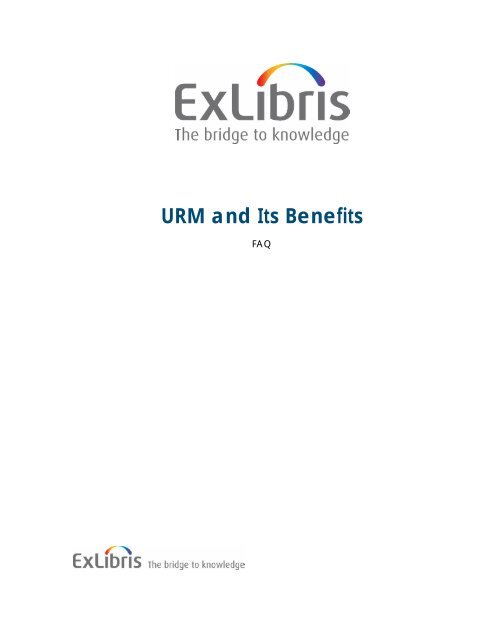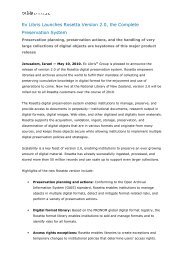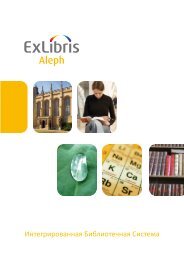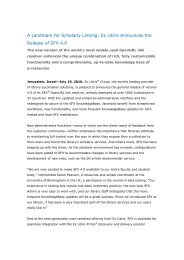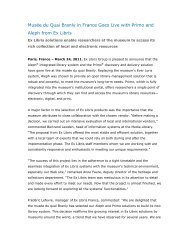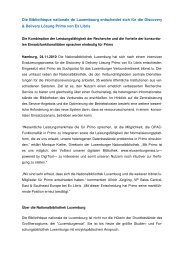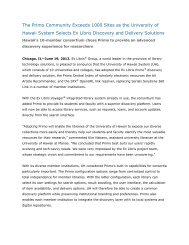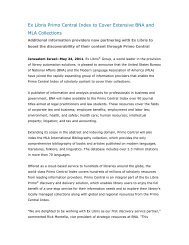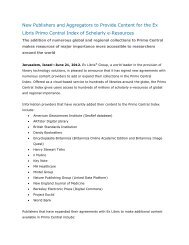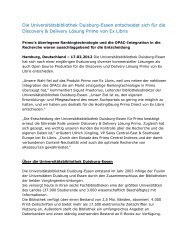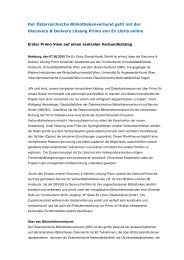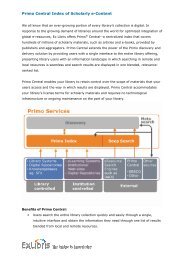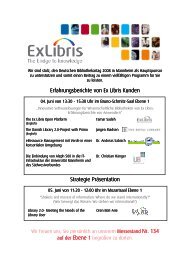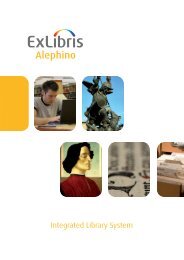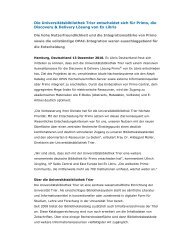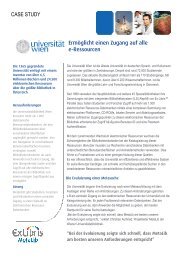Unified Resource Management FAQ - Ex Libris
Unified Resource Management FAQ - Ex Libris
Unified Resource Management FAQ - Ex Libris
Create successful ePaper yourself
Turn your PDF publications into a flip-book with our unique Google optimized e-Paper software.
URM and Its Benefits<br />
<strong>FAQ</strong>
CONFIDENTIAL INFORMATION<br />
The information herein is the property of <strong>Ex</strong> <strong>Libris</strong> Ltd. or its affiliates and any misuse or abuse will result in<br />
economic loss. DO NOT COPY UNLESS YOU HAVE BEEN GIVEN SPECIFIC WRITTEN AUTHORIZATION FROM<br />
EX LIBRIS LTD.<br />
This document is provided for limited and restricted purposes in accordance with a binding contract with <strong>Ex</strong> <strong>Libris</strong><br />
Ltd. or an affiliate. The information herein includes trade secrets and is confidential.<br />
DISCLAIMER<br />
The information in this document will be subject to periodic change and updating. Please confirm that you have the<br />
most current documentation. There are no warranties of any kind, express or implied, provided in this<br />
documentation, other than those expressly agreed upon in the applicable <strong>Ex</strong> <strong>Libris</strong> contract. This information is<br />
provided AS IS. Unless otherwise agreed, <strong>Ex</strong> <strong>Libris</strong> shall not be liable for any damages for use of this document,<br />
including, without limitation, consequential, punitive, indirect or direct damages.<br />
Any references in this document to third‐party material (including third‐party Web sites) are provided for<br />
convenience only and do not in any manner serve as an endorsement of that third‐party material or those Web sites.<br />
The third‐party materials are not part of the materials for this <strong>Ex</strong> <strong>Libris</strong> product and <strong>Ex</strong> <strong>Libris</strong> has no liability for such<br />
materials.<br />
TRADEMARKS<br />
ʺ<strong>Ex</strong> <strong>Libris</strong>,ʺ the <strong>Ex</strong> <strong>Libris</strong> bridge , Primo, Aleph, Alephino, Voyager, SFX, MetaLib, Verde, DigiTool, Preservation,<br />
URM, Voyager, ENCompass, Endeavor eZConnect, WebVoyage, Citation Server, LinkFinder and LinkFinder Plus,<br />
and other marks are trademarks or registered trademarks of <strong>Ex</strong> <strong>Libris</strong> Ltd. or its affiliates.<br />
The absence of a name or logo in this list does not constitute a waiver of any and all intellectual property rights that<br />
<strong>Ex</strong> <strong>Libris</strong> Ltd. or its affiliates have established in any of its products, features, or service names or logos.<br />
Trademarks of various third‐party products, which may include the following, are referenced in this documentation.<br />
<strong>Ex</strong> <strong>Libris</strong> does not claim any rights in these trademarks. Use of these marks does not imply endorsement by <strong>Ex</strong> <strong>Libris</strong><br />
of these third‐party products, or endorsement by these third parties of <strong>Ex</strong> <strong>Libris</strong> products.<br />
Oracle is a registered trademark of Oracle Corporation.<br />
UNIX is a registered trademark in the United States and other countries, licensed exclusively through X/Open<br />
Company Ltd.<br />
Microsoft, the Microsoft logo, MS, MS‐DOS, Microsoft PowerPoint, Visual Basic, Visual C++, Win32,<br />
Microsoft Windows, the Windows logo, Microsoft Notepad, Microsoft Windows <strong>Ex</strong>plorer, Microsoft Internet<br />
<strong>Ex</strong>plorer, and Windows NT are registered trademarks and ActiveX is a trademark of the Microsoft Corporation in the<br />
United States and/or other countries.<br />
Unicode and the Unicode logo are registered trademarks of Unicode, Inc.<br />
Google is a registered trademark of Google, Inc.<br />
Copyright <strong>Ex</strong> <strong>Libris</strong> Limited, 2009. All rights reserved.<br />
Document released: May 2009<br />
Web address: http://www.exlibrisgroup.com<br />
2
URM and Its Benefits: <strong>FAQ</strong><br />
What is URM?<br />
The <strong>Ex</strong> <strong>Libris</strong> <strong>Unified</strong> <strong>Resource</strong> <strong>Management</strong> (URM) framework provides an open,<br />
extensible platform that will support emerging and future needs, positioning libraries to<br />
better serve the overall teaching and research missions of their institutions they serve. The<br />
URM environment will lower the cost of traditional library operations; its network‐level<br />
infrastructure will streamline workflows for the management of print, electronic, and digital<br />
assets; and will offer new opportunities for collaboration, delivering increased efficiency<br />
and reducing redundancy within and across libraries.<br />
How will URM increase library efficiency and lower costs?<br />
URM will enable libraries to efficiently and effectively manage the full life cycle of all types<br />
of resources, regardless of format or acquisition method, at significantly lower costs than<br />
libraries incur today. By unifying the processes associated with obtaining, describing,<br />
managing, distributing, and analyzing diverse resources, URM will assist libraries in<br />
reevaluating and redesigning their back‐office processes, optimizing staff resources,<br />
integrating library systems more fully with other applications used by the organization,<br />
focusing new attention on underserved areas, and successfully addressing user needs.<br />
Economic realities have increasingly encouraged libraries to seek new ways of working<br />
together at a network level. By centralizing data and services in a software‐as‐a‐service<br />
environment, <strong>Ex</strong> <strong>Libris</strong> URM will support flexible models for collaboration across the<br />
functional spectrum—from cooperative collection development to more seamless sharing of<br />
3
metadata and resources with partner libraries. In this new network environment, libraries<br />
will be able to join forces to leverage technical support, purchasing power, collections, and<br />
even staff knowledge and resources.<br />
Today’s library collections reach far beyond traditional published material including the<br />
management of such items as primary datasets and associated research output, learning<br />
objects, and institutional archives. URM will provide the tools that libraries need for<br />
working in this new environment and expanding the library’s role in managing the<br />
intellectual output of the institution.<br />
Modularity and extensibility, facilitated by a service‐oriented architecture (SOA), fully<br />
documented Web services and application programming interfaces (APIs), are keystones of<br />
the URM framework. The ensuing URM framework will be easy to customize and enhance<br />
through locally developed code extensions that can be shared within the customer<br />
community via the <strong>Ex</strong> <strong>Libris</strong> EL Commons Website, which serves as a host for collaborative<br />
efforts.<br />
How will URM differ from an integrated library system?<br />
One of the key advantages of URM—and a feature that distinguishes it from current<br />
integrated library systems—is the unification of workflows regardless of the type of material<br />
being managed or the method of its acquisition. In the foreseeable future, libraries will<br />
continue to work in a hybrid environment, managing different back‐office processes related<br />
to print, electronic, and digital assets. Bringing together the selection, acquisition,<br />
management, and distribution of the entire library collection will provide new efficiencies,<br />
reducing costs and improving the service to users.<br />
4
Libraries however will have to do much more than redesign current processes to achieve<br />
greater efficiency in order to meet the expectations of today’s users undertaking entirely<br />
new kinds of activities has become equally as important. While URM incorporates the key<br />
capabilities of integrated library systems and electronic resource management systems, it is<br />
unique in that it will also enable libraries to go beyond traditional functions to provide new<br />
service offerings to institutions and the academic community. From its use of a centralized<br />
data‐services environment to its unified workflows for all types of library assets, the URM<br />
platform offers libraries with a new infrastructure that will support different—and<br />
increasingly important—tasks: the management of an institution’s intellectual output, a<br />
greater level of engagement in teaching and learning activities, and more. Although many of<br />
these tasks once lay outside of the library domain, changes in technology and the academic<br />
landscape have created a demand for libraries to assume a stewardship role regarding their<br />
institution’s intellectual activities and output.<br />
When will the first version of URM be released?<br />
<strong>Ex</strong> <strong>Libris</strong> is now finalizing requirements with its user community and development<br />
partners. Current plans call for a beta release of URM 1.0 in mid‐2011 and a general release<br />
at the end of that year.<br />
URM Functionality<br />
What will the first release of URM include?<br />
The first release of URM will support full life‐cycle management for print and electronic<br />
resources, providing libraries with more streamlined processing and enabling them to lower<br />
management costs.<br />
5
URM 1.0 will support the following areas:<br />
• Collection development<br />
• Acquisitions, including the management of both financial and license terms<br />
• Cataloging and inventory maintenance, using current and emerging metadata<br />
standards<br />
• Fulfillment, including new functionality necessary to streamline resource‐sharing<br />
activities<br />
• Dissemination control, including a new tool for publishing the library’s collection in<br />
user‐discovery spaces<br />
• Access to a central knowledge base, which will provide availability information for<br />
electronic resources in support of linking and other tasks<br />
• Consortium support across functional areas<br />
• Multilingual requirements<br />
• Reporting and analysis tools necessary to make data‐driven decisions about library<br />
activities and collections<br />
URM 1.0 will also support a centralized system for managing metadata (the Metadata<br />
<strong>Management</strong> System) and a data‐services environment, which together will provide new<br />
ways of creating, managing, and sharing metadata and other types of information that is<br />
common among libraries.<br />
The URM design and development effort is grounded in the <strong>Ex</strong> <strong>Libris</strong> commitment to open<br />
interfaces and community‐developed software, enabling libraries to customize their URM<br />
deployment according to local needs.<br />
6
How are you obtaining input from the library community about URM requirements?<br />
As part of its development processes, <strong>Ex</strong> <strong>Libris</strong> is working in close cooperation with library<br />
and industry partners as well as its worldwide user community. Specifically, <strong>Ex</strong> <strong>Libris</strong> has<br />
created the following formal collaborative roles:<br />
• Development partners: libraries that are engaging with <strong>Ex</strong> <strong>Libris</strong> intensively to<br />
validate the URM requirements and design and to participate in software testing<br />
• URM focus groups: functionally‐focused groups to advise <strong>Ex</strong> <strong>Libris</strong> on specific<br />
requirements in the areas of selection/acquistions, metadata, fulfillment, and<br />
consortium support. <strong>Ex</strong> <strong>Libris</strong> has worked closely with the ELUNA and IGeLU user<br />
groups to solicit nominations to ensure that libraries in diverse geographic regions<br />
and of diverse types and sizes would be amply represented.<br />
• Strategic partners: Complementing the detail‐oriented role of the focus groups,<br />
strategic partners which represent the wider library community, are charged with<br />
advising <strong>Ex</strong> <strong>Libris</strong> on emerging issues in the library landscape and helping to ensure<br />
that URM remains aligned with the high‐level goals of today’s libraries.<br />
Additional focus groups and other formal collaborative forums will be established<br />
throughout the course of the project. If your institution is interested in participating in one<br />
of these activities, please contact Susan Stearns, VP of strategic partnerships, at<br />
susan.stearns@exlibrisgroup.com.<br />
Where can I learn more about the conceptual design and functionality of the URM<br />
framework?<br />
<strong>Ex</strong> <strong>Libris</strong> has published a white paper (located on the URM <strong>Resource</strong> Center) that describes<br />
the conceptual framework of URM; this paper is an excellent starting point for learning<br />
more about planned URM functionality.<br />
7
<strong>Ex</strong> <strong>Libris</strong> will offer numerous opportunities for libraries to learn more about the company’s<br />
plans and to provide input, including regional information sessions, discussion groups at<br />
key conferences, Webinars, and postings on our New Initiatives blog. The URM <strong>Resource</strong><br />
Center is your source for details about these activities, as well as all of the latest information<br />
on URM.<br />
What does URM mean for Aleph and Voyager customers?<br />
With the move to a next‐generation library management system, libraries will be able to<br />
“turn off” their current integrated library systems and begin working exclusively on the<br />
URM platform. In this respect, URM replaces Aleph ® and Voyager ® .<br />
That said, <strong>Ex</strong> <strong>Libris</strong> recognizes that not all libraries will be ready to migrate to a next‐<br />
generation system right away. Therefore, Aleph and Voyager will continue to be actively<br />
developed, enhanced, and supported; there is no planned end of life for either of the <strong>Ex</strong><br />
<strong>Libris</strong> ILS products. In fact, the roadmaps for both Aleph and Voyager include many<br />
customer‐requested enhancements, demonstrating the <strong>Ex</strong> <strong>Libris</strong> commitment to ongoing<br />
investment in our ILS products.<br />
8


